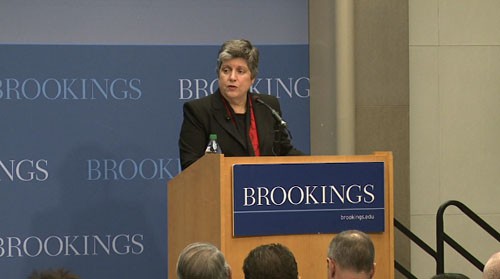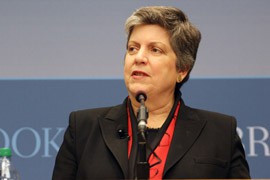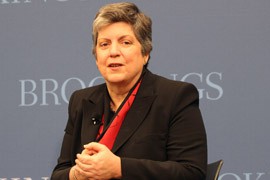Cronkite News has moved to a new home at cronkitenews.azpbs.org. Use this site to search archives from 2011 to May 2015. You can search the new site for current stories.
Napolitano: Defense of the homeland needs to include cyberspace
WASHINGTON – Department of Homeland Security Secretary Janet Napolitano said Tuesday that cybersecurity has gone from a fringe issue to becoming one of the top priorities for her department going forward.
“Cybersecurity has come to affect almost every aspect of modern life. All of us depend on cyber-controlled systems for energy, communications, transportation and defense,” she said.
The remarks came as part of Napolitano’s third annual State of Homeland Security address, in which she laid out priorities for the agency that included greater public involvement as well as comprehensive immigration reform.
Napolitano said the border is secure and that continued patrolling can only do so much, which is why it is time for immigration reform. She said that will address the causes for illegal crossings, including an out-of-date immigration system and a difficult guest-worker program.
“The most effective way to achieve greater border security is through commonsense immigration reform that strengthens employers’ accountability and that updates our legal immigration system,” she said. “Our immigration system has been broken for too long, and the time to fix it is now.”
But much of her focus was on the need for greater cybersecurity, as the agency moves from what Napolitano called DHS versions 1.0, 2.0 and 3.0.
DHS 1.0 were the years from the agency‘s founding post-9/11 until she took over four years ago, Napolitano said. The 2.0 model of DHS was represented by its recognition that threats to the country were constantly coming from different angles.
It was during that time that cybersecurity first started becoming a focus, she said.
“The cyber realm wasn’t even a major focus of the early department. Now, it is one of our five core mission areas,” she said.
Gail-Joon Ahn, associate professor of computer science and engineering at Arizona State University, agreed that cybersecurity should be a focus moving forward. He said the world is now connected in such a way that a security lapse in one entity can lead to security risks in others.
“In early 2001, 2002, we were looking at the exact same issues, but somehow we didn’t pay attention continuously,” Ahn said. “Now we realize our society is fully interconnected, so this is the time that we have to look into cybersecurity.”
With the department now several months into its second decade, Napolitano said it has to continue to adapt to future threats.
“This is not a day just to look back and pat ourselves on the back,” she said. “It’s a day to recommit and to move forward.”
Napolitano said that, looking forward, one of the critical aspects will be educating the public in good cybersecurity practices until performing them is “as routine as putting on a seatbelt.”
“For decades, industry and government have worked together to protect the physical security of critical assets that reside in private hands,” Napolitano said. “There is no reason we can’t work together in the same way to protect the cyber systems of our critical infrastructure.”










